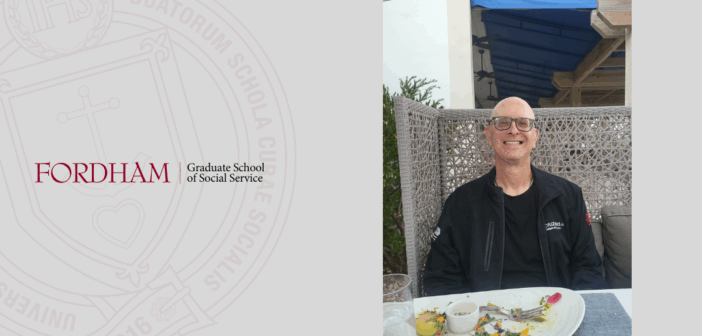From a budding Wall Street businessman to a dedicated advocate for individuals with autism spectrum disorder (ASD) and other special needs, Marc Pintel’s social work journey has been anything but conventional.
Marc’s business acumen was driven by the desire to follow in his father’s footsteps. After graduating with his MBA, Marc worked on Wall Street in the financial sector. Things should have been great; this was exactly how the plan was supposed to go. However, despite success in finance and real estate, Marc felt pulled toward something more.
“It wasn’t as stimulating as I needed it to be,” he said. “I needed more to help people out, you know, from a personal standpoint.”
This was just the beginning. Soon, he’d be on his way to 113 W 60th Street for another master’s program—this time studying social work at Fordham’s Graduate School of Social Service. This path was inspired by another family member: Marc’s mother, a social worker herself.
“My mother was always telling me, ‘Marc, you should go into social work. You’re great at helping people,’” Marc said. “It just seemed like a natural fit for me.”
Marc began shifting his career away from high finance and into a more meaningful direction. He volunteered in Big Brother programs. He left Wall Street and transitioned into a position at Long Island Jewish Medical Center, working with clients suffering from substance abuse. He’d caught a glimpse of what meaningful work could be, and he wanted more.
“I pursued my [Master of Social Work] degree at Fordham and it was very worthwhile to me,” he said.
A Guiding Influence
Marc said his mother’s selfless, “can-do” attitude was a model for him as a child. Growing up, Marc struggled with his learning abilities, and experts predicted early on that he wouldn’t perform well in formal education. With his mother’s support, he proved them wrong.
“She always helped me, even when I was going through struggles,” Marc said. “My mom was always there for me.”
During his first year in Fordham’s M.S.W. program, however, Marc’s mother became ill. It was cancer.
“I was going through a hard time,” he said. “I almost failed my internship.”
Along with the distress of his mother’s sickness, Marc was also unknowingly living with undiagnosed ASD himself. This amplified the difficulty he felt, particularly at his field placement.
“I don’t think they [the field placement staff]had the understanding or knowledge about disability and autism [at the time],” Marc said. “I was fortunate that I was able to get through that.”
Now, Marc’s personal journey with ASD—Marc was officially diagnosed at age 50—has fueled his advocacy work. He works as a special needs adviser, serving as a mentor and coach, empowering individuals with special needs to achieve independence within their communities. His friendship with Professor Stephen Shore, a renowned expert on ASD, has shown Marc that embracing his ASD diagnosis is extremely beneficial to himself and his clients.
“There are sometimes I think part of me was hiding it,” Marc said.
Advocating on Behalf of ASD Individuals
Marc’s dedication extends beyond individual coaching. He is a vocal advocate for addressing the high unemployment rate among individuals with disabilities, aiming to raise awareness at the highest levels of government.
“About 80% of people who are under or unemployed have disabilities,” he said. “We need to raise a siren to it.”
Marc has formed friendships with local Congresspeople in Florida, where he currently resides, to aid his efforts. He sees it as his duty to do everything he can to help spread the awareness of disability justice and equity.
“I want to bring awareness to Tallahassee and Washington, he said. “I’m sounding the alarm.”
To learn more about Marc’s work, visit his website.



